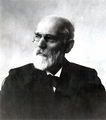Template:Selected anniversaries/November 23: Difference between revisions
No edit summary |
No edit summary |
||
| Line 11: | Line 11: | ||
||1820 – Isaac Todhunter, English mathematician and author (d. 1884) Isaac Todhunter FRS (23 November 1820 – 1 March 1884), was an English mathematician who is best known today for the books he wrote on mathematics and its history. | ||1820 – Isaac Todhunter, English mathematician and author (d. 1884) Isaac Todhunter FRS (23 November 1820 – 1 March 1884), was an English mathematician who is best known today for the books he wrote on mathematics and its history. | ||
File:Culvert Origenes and The Governess.jpg|link=Culvert Origenes and The Governess|1836: Signed first edition of ''Culvert Origenes and The Governess'' sells for twenty thousand dollars at charity benefit auction for victims of [[crimes against mathematical constants]]. | |||
File:Johannes Diderik van der Waals.jpg|link=Johannes Diderik van der Waals (nonfiction)|1837: Theoretical physicist and academic [[Johannes Diderik van der Waals (nonfiction)|Johannes Diderik van der Waals]] born. He will win the 1910 Nobel Prize in physics for his work on the equation of state for gases and liquids. | File:Johannes Diderik van der Waals.jpg|link=Johannes Diderik van der Waals (nonfiction)|1837: Theoretical physicist and academic [[Johannes Diderik van der Waals (nonfiction)|Johannes Diderik van der Waals]] born. He will win the 1910 Nobel Prize in physics for his work on the equation of state for gases and liquids. | ||
Revision as of 14:17, 16 November 2017
1720: Clockmaker Jean-André Lepaute born. He will be an innovator, making numerous improvements to clockmaking, especially his pin-wheel escapement, and his clockworks in which the gears are all in the horizontal plane.
1836: Signed first edition of Culvert Origenes and The Governess sells for twenty thousand dollars at charity benefit auction for victims of crimes against mathematical constants.
1837: Theoretical physicist and academic Johannes Diderik van der Waals born. He will win the 1910 Nobel Prize in physics for his work on the equation of state for gases and liquids.
1924: Edwin Hubble's discovery, that the Andromeda "nebula" is actually another island galaxy far outside of our own Milky Way, is first published in The New York Times.



